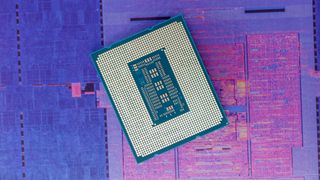Intel's CPU roadmap seems to be solidifying in front of our eyes. Or maybe it's about to get more confusing. I'm not 100% sure right now, but according to fresh rumours the new range of desktop chips coming our way in early 2024 should be Arrow Lake.
I know, another Lake, and even I—a repository of more code names than any sane man should keep locked in their head—am getting lost in all Intel's myriad bodies of water. Arrow Lake is the theoretical successor to Meteor Lake, and the first with a compute tile manufactured on Intel's future superstar 20A production node.
Meteor Lake in itself is Intel's first chiplet processor, though the company is sticking with the 'tile' nomenclature instead. The new processors are being built on the Intel 4 node (nominally its 7nm node), and are due later this year as Intel promises Meteor Lake is still on track (opens in new tab). But seemingly now it's definitely not on the desktop.
The rumour mongers have been flipping around on Meteor Lake's desktop existence like some asphyxiating fish for the past year, and the latest noises reported by Benchlife (opens in new tab) claim that the desktop Meteor Lake-S chip sporting six Performance-cores and 16-Efficient-cores is being cancelled in favour of Arrow Lake.
We've been pretty adamant all along that any Meteor Lake 6 + 16 design would have to be predominantly mobile-oriented (opens in new tab), and this latest rumour seems to lend credence to that assumption.
Instead of Meteor Lake, Intel will be bringing its Arrow Lake chips to desktop in the first half of 2024 with a maximum configuration matching today's 8 + 16 limits with the Core i9 13900K (opens in new tab) of Raptor Lake fame.
That actually seems like Arrow Lake is being launched earlier than previously expected, suggesting maybe the 20A process is further down the road than we thought. Which would make Pat Gelsinger's firm stance on the recent delay rumours (opens in new tab) seem on point.
"I feel good that we have turned the corner on many of the execution challenges," he said in response to a question about speculated delays. "These rumours, like many others, will be proven by our execution to be firmly false."
Intel has said recently that with the 20A development complete (opens in new tab) it would have chips manufactured in the first half of 2024. But we honestly didn't expect that would immediately translate into high-performance desktop chips being made available to consumers in the first six months of the year.


Best CPU for gaming (opens in new tab): The top chips from Intel and AMD
Best gaming motherboard (opens in new tab): The right boards
Best graphics card (opens in new tab): Your perfect pixel-pusher awaits
Best SSD for gaming (opens in new tab): Get into the game ahead of the rest
The 20A process is significant for Intel as it's the first of the RibbonFet design (also known as Gate All Around) as well as the first chip to use the new PowerVia backside power delivery system. That should help put the curbs on power demands growing ever higher, and when you couple that with promised advances to the Lion Cove Performance-core design, which could deliver more than 20% IPC uplift over Meteor Lake, you've got some potentially very exciting CPUs on the horizon from Intel.
Obviously, it being Intel you're going to need a whole new motherboard. The new chips will use an LGA 1851 socket, a socket with more pins than the current LGA 1700 that houses the Alder and Raptor Lake generations. These 800-series boards are going to deliver a pure-bred DDR5 platform instead of the hybrid DDR4/5 configuration of the 600- and 700-series boards. But they're also going to reportedly offer more PCIe lanes, too, with 48 lanes compared with 28 of the latest Intel chipsets.
So yeah, seems like Intel might well be "on track" as promised. Here's hoping.

